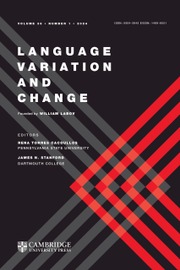Article contents
The social status of Arabic, French, and English in the Senegalese speech community
Published online by Cambridge University Press: 17 March 2004
Abstract
This study is part of a larger unpublished work. The data collection is based on the Labovian sociolinguistic interview: 200 randomly selected Wolof speakers were interviewed and recorded for 20 minutes in Senegal. They were divided into two groups: 100 subjects over 50 years old and 100 subjects between 20 and 30 years old. Each group comprised 50 males and 50 females. The number of loanwords from Arabic, French, and English in subjects' vernacular was statistically analyzed using the Wilcoxon (rank sums) test across three registers (cultural, political, and religious), age groups, and gender. The study argues that loanwords in Wolof reflect the social groups in Senegal and the prestige of lender-languages. First, the article discusses the influence of foreign languages in Senegal. Second, it examines the social status of loanwords from these languages. Third, it shows the relationships between loanwords, registers, age group, and gender in Senegal.
- Type
- Research Article
- Information
- Copyright
- © 2003 Cambridge University Press
References
REFERENCES
- 7
- Cited by


